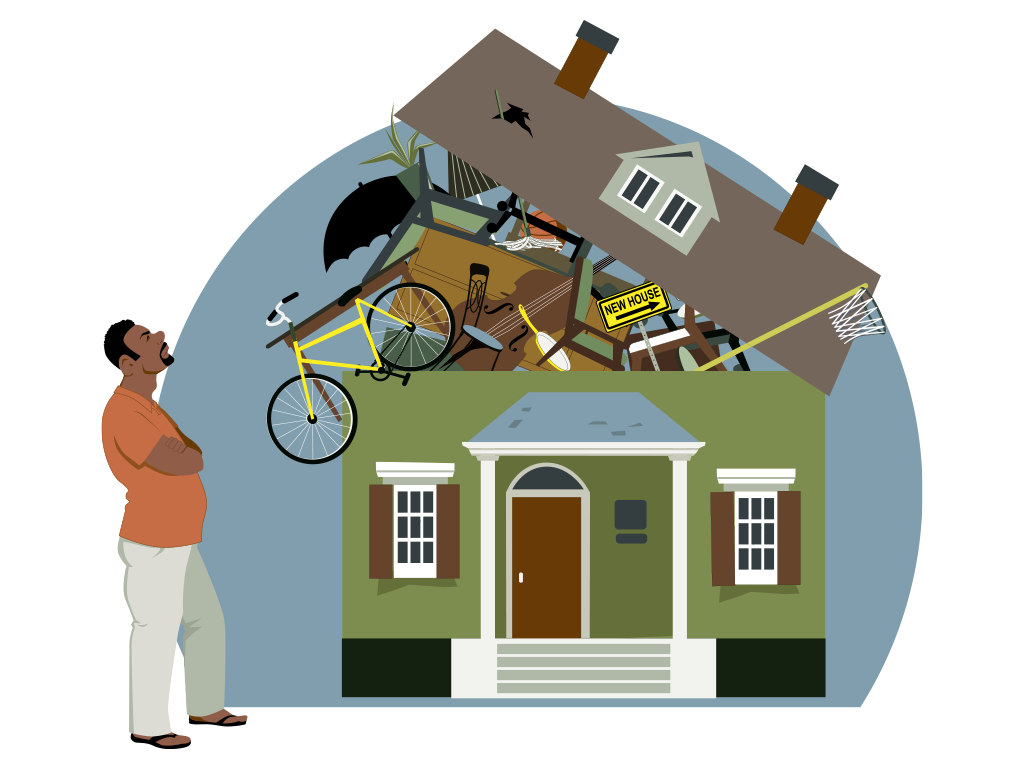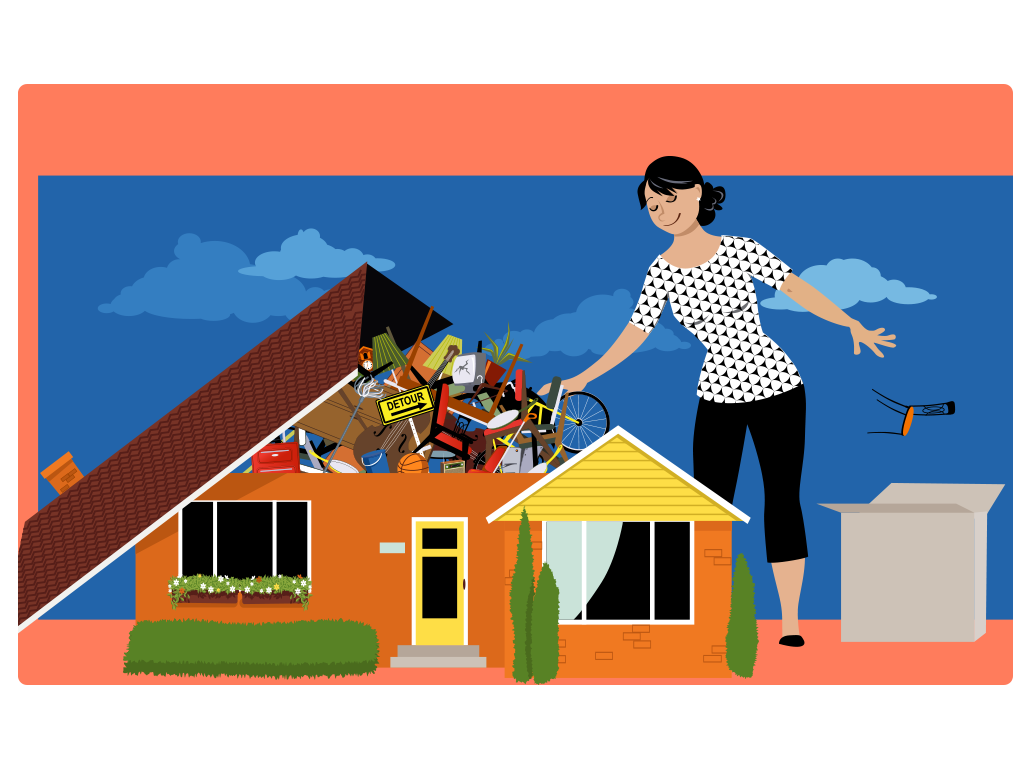Why Do People Hoard? – Reasons of Hoarding

All About Hoarding
Right now, there are more than 1.2 million compulsive hoarders in the U.S. alone. What is a “compulsive hoarder”? Medical dictionaries note that the condition affects anyone who exhibits an uncontrolled need to buy or somehow acquire large numbers of items for no clear, logical reason. To make matters worse, the conditions develops gradually and continuously, leading to clutter in all areas of a person’s home. Eventually, sufferers end up in desperate conditions and face a serious impairment.
Someone with the disorder typically refuses to part with even the most insignificant items in their vast inventory of goods. If they feel pressure to clear up the clutter, they often begin to act out in irrational, often dangerous ways. That’s because even the idea of getting rid of a single item causes them severe emotional distress.
The irony of the situation is that most of the hoarded items are never used or even looked at by the sufferer. But if you ask “Why do you keep all this stuff?” they’ll come up with an answer about how they “someday” plan to use the items. Of course, the answers don’t really make sense and the person is simply trying to rationalize why they keep so much useless, often worthless junk.
The Five Levels of Hoarding
Medical experts use a published, scientifically based scale to measure the severity of hoarding disorder. It’s called the NSGCD Clutter Hoarding scale. The NSGCD is the National Study Group on Chronic Disorganization. They list five levels on their scale, each one of which indicates a particular phase of the disorder. The higher the number, the worse the condition is for the sufferer. For example, level one includes situations where there is only a small amount of clutter in a person’s living space. The next two levels, however, show “chronic disorganization.” Finally, at levels four and five, a person might be residing in a space that is unsanitary, dangerous and possibly not fit for human habitation.
Complications
Like many serious psychological disorders, hoarding is often misunderstood or not even noticed by the person who suffers from the condition. For example, someone who is at the fourth level might live in a house where no cleaning or maintenance has been done for a long while. Yet the person takes no notice of how physically and hygienically dangerous their lifestyle is. Many such homes are in danger of catching fire or spreading communicable diseases.
Worn out electrical cords and frayed wires can even electrocute an unsuspecting occupant, while piles of paper goods near stoves or furnaces, due to minimal storage space, often leads to fires. A byproduct of chronic hoarding can also include a putrid stench, aggregation of mold, mildew and roach infestation.
Dr. Rebecca Beaton, founder and director of the Anxiety & Stress Management Institute, hoarders often suffer from severe depression due to their total inability to throw anything away. For many sufferers, this sort of irrational behavior is one way to compensate for an emotional emptiness that began with anxiety and misery in early or late childhood.
Physical objects, for someone with the disorder, can act as substitutes companionship, security and fulfillment. For many hoarders at advanced stages, it’s nearly impossible to make even a routine decision about anything, especially when it comes to letting go of possessions, organizing them or cleaning up the space where things are kept.
In fact, people who reach level four or five on the NSGCD scale live lives completely engulfed in clutter. They’ve usually found a way to completely detach themselves from stench, fire hazards, lack of hygiene and related conditions. Sadly, the chance that a hoarder will return to a normal, clutter-free life is minuscule. The only hope for them is to seek the support of a professional psychologist or therapist who has experience in treating the disorder.
Symptoms of Hoarding
Many adults worry about relatives who seem to show symptoms of hoarding disorder. The question they often ask is, “What are the signs and symptoms of hoarding, and is the problem one that usually affects older people?”
Actually, even though most sufferers are older folks, experts believe that hoarding symptoms begin to appear in people when they are in their early teens. Because the condition is both progressive and chronic, it will only continue to get worse unless professional help is sought. There are at least 10 early signs that tend to show up in adolescents who are in the beginning stages of the disorder. Some are very hard to spot because they are only mild, non-obvious hoarding symptoms but do show a need for help, nonetheless.
Once a person reaches adulthood or middle age, typical hoarding symptoms become more clear, but it’s important to note that not all people who show these early warning signs will end up having the disorder. What are the 10 most common early signs that a young teenager might later suffer from a hoarding disorder? They include the following, either singly or in groups of two or more:
- Problems paying attention or keeping attention for more than a few minutes
- Having to struggle to make routine decisions about various things
- Marked difficulty in throwing away, giving away, selling or recycling their possessions
- Inability to see that they have a problem even when it’s pointed out to them
- Keeping items in their beds with them while they sleep at night
- Shopping too much or amassing “free” objects and products that were “too good to pass up”
- Rearranging piles of items and not getting rid of them
- Difficulty categorizing their items or organizing them in a meaningful way
- Problems with piles of stuff, like books or papers, that keep falling over
- Masses of clutter that make it hard to move around in their bedrooms
Check the Bedroom
Note that many of the early hoarding symptoms you might see in teenagers show up in their bedrooms, and not in the entire house. For adults, the problems go beyond the bedroom and can be anywhere. The reason for this is that teens often have no control over any space in the home except for their own bedrooms. So, if you have a teen and want to check for hoarding symptoms, take a look at their bedrooms or any areas where they have exclusive control of the space and a good amount of privacy.
Why Do Otherwise Normal People Hoard Objects?
The main reason someone hoards is because they think the items will be valuable or somehow useful to them in the near or distant future. Often, they keep items that have special sentimental value, are not easy to replace, are unique in some way, or were acquired at a huge discount. Getting “a really good deal” on something can be an attractive lure to a hoarder, even if they have no need for the product. Another reason for hoarding is related to the memory.
People who suffer from the disorder often believe that one or another item will help them remember a significant event in their lives or a person of great importance to them. Finally, hoarders might keep an item simply because they can’t find a proper place to put it. The rule seems to be, “When in doubt, keep it.”
It’s important to realize that hoarding disorder is not always a “stand-alone” problem, meaning that is it sometimes a sign that another, larger-scale disorder is present. For example, many hoarders simultaneously are challenged with depression, ADHD (attention deficit, hyperactivity disorder), OCD (obsessive compulsive disorder), or OCPD (obsessive compulsive personality disorder). It’s even possible for hoarding to be connected to various eating disorders, dementias, certain forms of psychosis, and possibly a genetic disorder called Prader-Willi Syndrome.
Answering the question, “Why do people hoard?” is a complex task best left to medical professionals. If you notice hoarding symptoms in someone you know and want to help, do what you can, without being too forceful, to get professional help for the person. It’s a fact that hoarding will not “cure itself,” but needs to be treated by someone with medical credentials.

About Jennifer Hanzlick
Clutter Trucker is a Denver-based hoarding clean-out company founded by Jennifer Hanzlick. Jennifer leveraged 15 years of corporate experience in to start the company in 2008. Her mission is to help and educate individuals and their loved ones who have hoarding disorder. A featured speaker at Ted X Boulder, Jennifer works directly with community and non-profit organizations to boost public awareness about the condition. To that end, she founded the Colorado Hoarding Task Force in 2015.
 720-982-7856
720-982-7856



